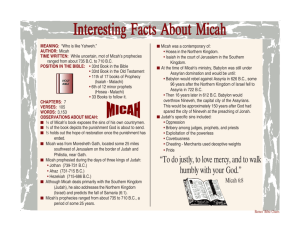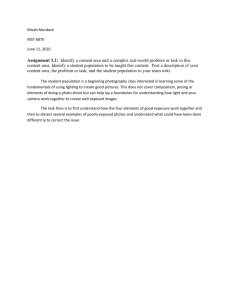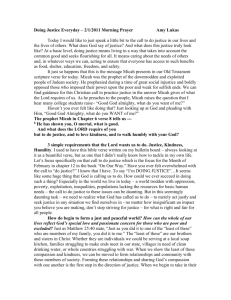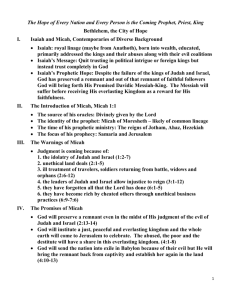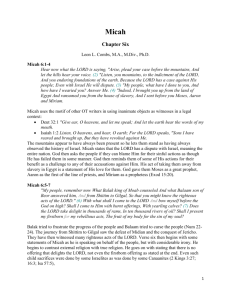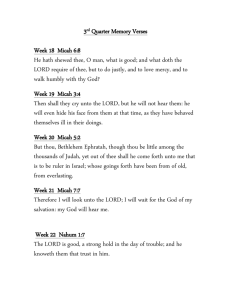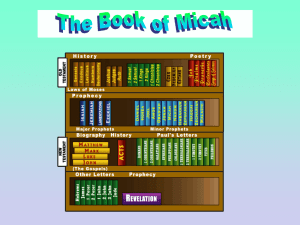An introduction and chapter one of Micah
advertisement
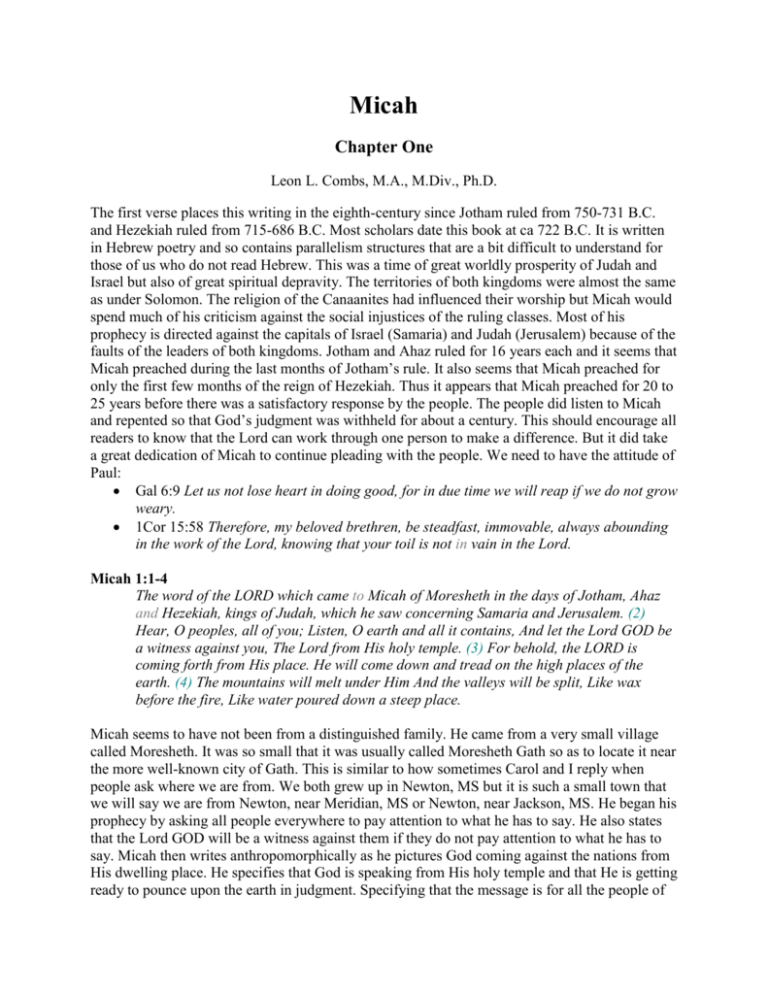
Micah Chapter One Leon L. Combs, M.A., M.Div., Ph.D. The first verse places this writing in the eighth-century since Jotham ruled from 750-731 B.C. and Hezekiah ruled from 715-686 B.C. Most scholars date this book at ca 722 B.C. It is written in Hebrew poetry and so contains parallelism structures that are a bit difficult to understand for those of us who do not read Hebrew. This was a time of great worldly prosperity of Judah and Israel but also of great spiritual depravity. The territories of both kingdoms were almost the same as under Solomon. The religion of the Canaanites had influenced their worship but Micah would spend much of his criticism against the social injustices of the ruling classes. Most of his prophecy is directed against the capitals of Israel (Samaria) and Judah (Jerusalem) because of the faults of the leaders of both kingdoms. Jotham and Ahaz ruled for 16 years each and it seems that Micah preached during the last months of Jotham’s rule. It also seems that Micah preached for only the first few months of the reign of Hezekiah. Thus it appears that Micah preached for 20 to 25 years before there was a satisfactory response by the people. The people did listen to Micah and repented so that God’s judgment was withheld for about a century. This should encourage all readers to know that the Lord can work through one person to make a difference. But it did take a great dedication of Micah to continue pleading with the people. We need to have the attitude of Paul: Gal 6:9 Let us not lose heart in doing good, for in due time we will reap if we do not grow weary. 1Cor 15:58 Therefore, my beloved brethren, be steadfast, immovable, always abounding in the work of the Lord, knowing that your toil is not in vain in the Lord. Micah 1:1-4 The word of the LORD which came to Micah of Moresheth in the days of Jotham, Ahaz and Hezekiah, kings of Judah, which he saw concerning Samaria and Jerusalem. (2) Hear, O peoples, all of you; Listen, O earth and all it contains, And let the Lord GOD be a witness against you, The Lord from His holy temple. (3) For behold, the LORD is coming forth from His place. He will come down and tread on the high places of the earth. (4) The mountains will melt under Him And the valleys will be split, Like wax before the fire, Like water poured down a steep place. Micah seems to have not been from a distinguished family. He came from a very small village called Moresheth. It was so small that it was usually called Moresheth Gath so as to locate it near the more well-known city of Gath. This is similar to how sometimes Carol and I reply when people ask where we are from. We both grew up in Newton, MS but it is such a small town that we will say we are from Newton, near Meridian, MS or Newton, near Jackson, MS. He began his prophecy by asking all people everywhere to pay attention to what he has to say. He also states that the Lord GOD will be a witness against them if they do not pay attention to what he has to say. Micah then writes anthropomorphically as he pictures God coming against the nations from His dwelling place. He specifies that God is speaking from His holy temple and that He is getting ready to pounce upon the earth in judgment. Specifying that the message is for all the people of the earth as a witness against them is a statement that God will be judging everyone by His judgment against His people. If God will judge His own people, surely He will judge everyone. The high places refer to the ruling areas of the world. By stating that God will come from His place to judge the rulers of the earth is a basic OT statement of the total sovereignty over everything and everybody. Verse four is a way of stating that God’s judgment will be unstoppable as He rules over everything. God will visit His judgement over the world as a waterfall over a steep hill cannot be slowed. Micah 1:5-8 All this is for the rebellion of Jacob And for the sins of the house of Israel. What is the rebellion of Jacob? Is it not Samaria? What is the high place of Judah? Is it not Jerusalem? (6) For I will make Samaria a heap of ruins in the open country, Planting places for a vineyard. I will pour her stones down into the valley And will lay bare her foundations. (7) All of her idols will be smashed, All of her earnings will be burned with fire And all of her images I will make desolate, For she collected them from a harlot's earnings, And to the earnings of a harlot they will return. (8) Because of this I must lament and wail, I must go barefoot and naked; I must make a lament like the jackals And a mourning like the ostriches. The rulers had been paying only lip service to Yahweh as they had allowed the Canaanite religion to influence their worship. They had disregarded the required social status of the nation as we will see clearly. The question “What is the rebellion of Jacob?” literally reads “Who is Jacob’s transgression?” It seems that Micah wants to infer them to be harlots. God will turn Samaria into a ruin by even destroying its foundation. The idolatry they practiced led to many idols and earnings from the poor so God will smash the idols and burn up their earnings with fires. The images they collected also from their idolatry and they will be returned as the invading Assyrians would transfer the wealth of Samaria to their temples for idolatrous worship. Micah then represented himself as wailing about naked as required of such deep mourning as evidenced by that of David (2 Sam 15:30). Micah 1:9-13 For her wound is incurable, For it has come to Judah; It has reached the gate of my people, Even to Jerusalem. (10) Tell it not in Gath, Weep not at all. At Beth-le-aphrah roll yourself in the dust. (11) Go on your way, inhabitant of Shaphir, in shameful nakedness. The inhabitant of Zaanan does not escape. The lamentation of Beth-ezel: "He will take from you its support." (12) For the inhabitant of Maroth Becomes weak waiting for good, Because a calamity has come down from the LORD To the gate of Jerusalem. (13) Harness the chariot to the team of horses, O inhabitant of Lachish-- She was the beginning of sin To the daughter of Zion-- Because in you were found The rebellious acts of Israel. The judgment to come to Samaria was stated as incurable, meaning that it was irreversible. It has even come to Jerusalem also. Now Micah embarks on some great puns that are not evident by those who do not read Hebrew and especially Hebrew poetry. Micah uses six verses to list cities of Judah that will be involved in the coming disaster. Micah knows these people since he is from there and he does not want them to suffer what will be caused by the sins of the rulers of the larger cities. The Hebrew word for “Gath” is similar to the Hebrew word for “tell” so he is saying not to tell it to the town that tells all. He does not want them to weep but it is up to them to repent. The second city’s ending name is like “aphar” that means “dust”. He is then telling them to repent by rolling in the dust as indicated by their name. The next city is Shaphir and that Hebrew name sounds like the word for “beautiful”. He is telling them to remove what seems to be beautiful from them and repent in shameful nakedness. The word for Zaanan sounds like the Hebrew word for “exit” or “go out” so he is telling them that they will hide within their walls and not escape as the city falls. The name Beth-ezel means “the nearby city” but on the day of judgement it will not be a city nearby to help for God will take away its support. Maroth means bitterness so the city will writhe in bitterness without repentance. Lachish was a famous military city about thirty miles southwest of Jerusalem and was renowned for its chariot horses. However they will not fight but will harness their horses and flee as the city is taken during Sennacherib’s invasion. He even used scenes of his invasion to decorate his palace in Nineveh. They will fall because the rebellion of Israel was also in that city. Micah 1:14-16 Therefore you will give parting gifts On behalf of Moresheth-gath; The houses of Achzib will become a deception To the kings of Israel. (15) Moreover, I will bring on you The one who takes possession, O inhabitant of Mareshah. The glory of Israel will enter Adullam. (16) Make yourself bald and cut off your hair, Because of the children of your delight; Extend your baldness like the eagle, For they will go from you into exile. Micah’s home town of Moresheth sounds like the Hebrew word for “betrothed” so he speaks of giving the city wedding gifts as she becomes wedded to her new conqueror. The word “Achzib” sounds like the Hebrew word for “deceitful, disappointing” and she will then prove deceptive to the kings of Israel. Mareshah is related to the Hebrew word for “possessor, heir” so she will be possessed by someone else. Adullam was the city of refuge where David stayed during the time when he was fleeing from Saul. Micah writes that this city will again be inhabited by the aristocracy of Israel as they flee. The chapter ends as Micah urges the rulers of Jerusalem to go into repentance by outer appearances so as to help these smaller cities which he states are their children. He then uses the word “exile” for the first time as he tells them that unless they repent all of those “children” will be put into exile as slaves indicating the end of the nation.
